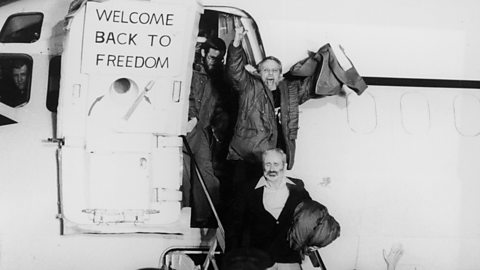US involvement with Iran and Iraq
Since World War Two, the USA had become increasingly interested in events in the Middle East - this was where most of the worldвҖҷs oil came from. By the 1970s, the rise of Islamic extremismMuslims who follow a very strict interpretation of Islamic teachings. was threatening peace and potentially American oil supplies as well.
Iranian hostage crisis
Iran was one of the countries in the oil-producing Persian GulfArea of sea to between Saudi Arabia and Iran. In 1979, America was concerned this would be under threat from the Soviet Union if its invasion of Afghanistan succeeded. region that were friendly with the USA. The shahThe title of the monarch of Iran. of Iran was trying to reform Iran - attempting to introduce reforms that would make it more like a modern western European country - especially in relation to its industries, but also by giving more freedom to women in Iranian society.
Islamic extremists opposed and resisted these reforms. In January 1979, the shah escaped from Iran with his family. The Islamic fundamentalistA Muslim who follows a strict interpretation of Islamic teaching. Ayatollah Khomeini now took control of Iran and set about creating a state based around principles held by Islamic fundamentalists. He denounced the USA as вҖҳthe Great SatanвҖҷ.

- In November 1979, the American embassy in Tehran, the capital of Iran, was captured by extremists.
- 66 American people working there were taken as hostages.
- Khomeini said he would exchange the hostages in exchange for the shah - who was in America at the time.
- The US president, Jimmy Carter, refused and threatened to attack Iran.
- An American attempt to rescue the hostages in April 1980 failed and led to fatalities.
- Failure to secure the release of the hostages damaged President CarterвҖҷs popularity and contributed to him losing to Ronald Reagan in presidential election.
- When the shah died in July 1980, negotiations to get the hostages freed continued.
- The hostages were released 444 days after they had been captured, on the day Reagan became president in January 1981.
The Iran-Iraq War
Iraq, the country next to Iran, was ruled by the dictatorA ruler with complete power. Saddam Hussein. There were long-standing arguments between them about territory and religion.
While Iran was distracted dealing with the Americans and trying to introduce its Islamic reforms, Saddam Hussein decided to invade Iran. This started an eight-year war between the two countries that resulted in over half a million deaths and threatened oil supplies from the Persian Gulf.
Fighting in the war quickly became a stalemateA deadlock situation where no side can act or win. fought in trenches with chemical weapons, as well as air and missile strikes on each otherвҖҷs cities. At one point, the war broadened out to include attacking oil tankers in the Persian Gulf. This led to the USA and other countries stationing ships there to protect the tankers.
The USA was already suspicious of Iran after the hostage crisis. However, it saw Iraq as a country that had rejected communistSupporters of the communist movement or party. interference, so it was a possible ally even though the USAвҖҷs official position was one of neutrality. The USA opened up diplomacyA way that countries try to avoid wars by using peaceful talks to resolve problems and business relations with Iraq while in secret giving the country financial aid, weapons and intelligence.
Irangate
When Iran helped to negotiate with terroristSomeone who uses violence for political reasons, usually to spread fear. who had captured some Americans in 1983, the USA began to secretly sell weapons to Iran. The USA then gave some of this money to fund rebels, fighting the communist government in the South American country of Nicaragua. However it had been previously agreed in Congress that no more money would be given to the rebels. Therefore, both the selling of weapons to Iran and the funding of rebels in Nicaragua broke the law. When news of this broke in America in 1986, President Reagan was forced to go on television to say that he had not authorised these dealings. The events became known as the Irangate ScandalWhen it was revealed that the US government had been illegally selling weapons to Iran and funding rebels in Nicaragua.
The end of the Iran-Iraq War
The war ended in 1988. Once it was over, Iraq claimed victory but had enormous debts from the war to pay off. Both countries had the same territory they had started with.